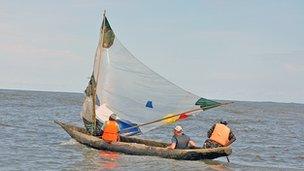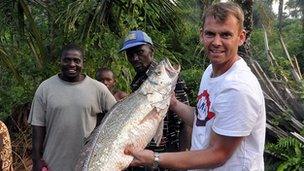The toughest place to be a fisherman
- Published
For centuries the fertile fishing grounds off Sierra Leone have provided a living for coastal villagers, but unwelcome intruders are now threatening their way of life. Has it become the toughest place to be a fisherman?
Each morning, Ishmael Kain and his cousin Kaba Kain push their canoe from the sandy beach of their tiny fishing village out towards the open sea.
Together they furiously paddle the canoe, called a kru, out through the fast-moving breakers - often rising up to four metres high - which form a daunting obstacle on the path to the best fishing grounds.
These coral blue waters are home to large catfish, barracuda and sea bream. In the past they yielded enough fish to feed the village of around 100 people and a small surplus to sell.
But not any more. Now the villagers' way of life hangs in the balance.
Ishmael and Kaba bait their fishing lines, drop them over the side of their canoe carved from a hollowed-out tree and slump exhausted to wait for the fish to bite. But the fish are not biting.
"I'm drawing the hook now. So far, we catch nothing yet, so I feel bad," Ishmael laments.
The men do manage to land one fish, but it is not enough.
"We didn't catch enough fish, so no-one will eat for the rest of the day," says Ishmael later, sitting by the village fire.
Later that night, the reason for the tiny catch becomes clear.
At 03:00 in the morning, under cover of darkness three large trawlers are spotted just offshore.
It is a chance for Ishmael and Kaba to prove what has been happening to British fishing boat skipper Andy Giles who has travelled to Sierra Leone with a BBC film crew.
After waking him, they point out the lights out at sea.
"This is the trawler. Here, here and another one here."
Three thousand miles from his home in Cornwall, Andy, aged 40, is just beginning to get a sense of just how hard the lives of his fellow fishermen in Sierra Leone can be.
"The trawlers were so close, I could actually hear them," he says.
"What they don't scoop up, they chase away. That's why there's nothing here."
The rich coastal fishing grounds are supposed to be protected by a five-mile exclusion zone but it's poorly enforced, so increasingly foreign boats are coming here to fish illegally.
The trawlers, some from as far afield as China, are only after high-value fish destined for the dining tables of Europe and the Far East. Thousands of tons of fish that local people could eat is simply thrown back over the side.
The presence of the trawlers also increases the danger of the fisherman's job.
"Last year my nephew was on the boat," says Ishmael in a broken voice.
"The trawler boat came and pulled our fishing net away. Then our boat hit the trawler and my nephew went over. The little boy was forced into the sea."
The boy drowned, and Ishmael does not believe the trawler's actions were an accident.

The sail is made made from plastic sheeting and a canvas parasol
"Even if you are screaming at them they refuse to slow down," he says.
Angered by the latest overnight visit from the trawlers, Ishmael, Kaba and Andy head to Freetown port where the trawlers gut, box and refrigerate their haul ready for export.
The trawlermen make it clear they do not want to talk.
As they skirt one of the vessels in the harbour in a small, hired motorised boat, lumps of metal and heavy stones rain down on them.
"I can't believe how close that was. He was firing stones or bits of steel off the deck," says Andy.
The missiles continue to pepper the water, as the fishermen speed away.
The poor catch and violent encounter with the trawlers has brought home to Andy the problems the villagers face.
"I feel their anger, but what can you do? You've got a wood canoe basically against a 30-metre steel trawler. They can't do anything," he says, wiping sweat from his brow.

In the UK, Andy Giles is skipper of the high-tech trawler 'Guiding Light'
Back in the village, any spare fish caught but not eaten is smoked in the large thatched hut managed by Fatima, Ishmael's wife, in readiness for sale at the local market. It is hot, choking work.
A good week's surplus fish might make the fishermen just $8 (£5) at market.
But that is a good week. Months of poor catches have left Kaba in debt to local money lenders.
Working from their small canoe with its sail fashioned from plastic bags and a canvas parasol, Ishmael and Kaba do occasionally land a good catch.
Andy is pleased to have taken part in one of these successful trips.
"I feel like I want to help out as these are good, good men just working to provide for their families," he says.
"It feels good to have gone out and actually caught seven big fish, so now we actually eat tonight."
For the battle-hardened fishermen of Sierra Leone, this is but a small victory in an ongoing struggle for survival on the high seas.
Toughest Place to be a Fisherman is on BBC Two at 21:00 GMT on Sunday 5 February or watch online via iPlayer (UK only) at the above link.